EDF Bundle
What Drives EDF Company's Strategy?
Every successful company hinges on a strong foundation, and for EDF, that foundation is built on its mission, vision, and core values. Understanding these elements is crucial for grasping EDF's strategic direction and its place in the evolving energy landscape.
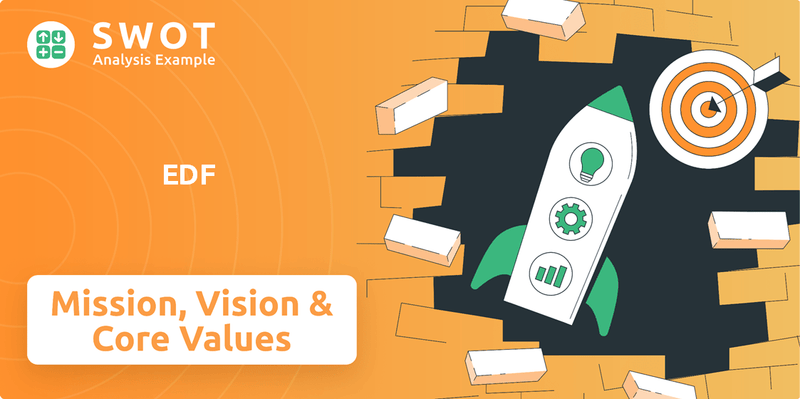
This exploration delves into the core principles that shape EDF's identity and actions. Discover how EDF's mission, vision, and core values guide its EDF SWOT Analysis, influence its strategy, and define its commitment to a sustainable future. Learn about EDF's goals and how they are working towards achieving them. Examining these principles provides invaluable insights into EDF's operations and its impact on the energy sector, offering a comprehensive understanding of EDF's approach to renewable energy and its long-term vision for the future.
Key Takeaways
- EDF's mission focuses on a net-zero energy future, driving the energy transition.
- 'Ambitions 2035' plan shapes EDF's strategic vision, emphasizing low-carbon generation.
- Innovation and sustainability are core to EDF's identity and future success.
- Alignment with mission and values is crucial for navigating the evolving energy landscape.
- EDF aims to balance environmental responsibility with affordable energy access.
Mission: What is EDF Mission Statement?
EDF's mission is 'to build a net zero energy future with electricity and innovative solutions and services, to help save the planet and drive well-being and economic development.'
Let's delve into the intricacies of the EDF mission statement.
The EDF company mission statement is expansive, targeting a global market. It aims to serve both individuals and economies, reflecting a commitment to widespread impact.
While electricity is the core offering, the mission extends to 'innovative solutions and services.' This highlights EDF's adaptability to evolving energy needs. The company is not just a utility provider; it's an energy solutions provider.
The mission's focus on a 'net zero energy future' establishes a unique value proposition. This emphasizes environmental responsibility and a commitment to combating climate change, a key aspect of the EDF vision.
EDF's business operations directly reflect its mission. Significant investments in low-carbon electricity generation, primarily nuclear and renewable sources, are a testament to this. For example, EDF has a substantial nuclear fleet, contributing significantly to its low-carbon energy mix.
EDF is actively involved in developing wind, solar, and energy storage projects. These initiatives underscore its commitment to delivering renewable solutions, further solidifying its dedication to the EDF mission.
The mission is strongly oriented towards environmental sustainability and innovation. EDF's focus on addressing climate change and driving economic development through clean energy illustrates its core values in action. The company's strategy prioritizes both.
Understanding the EDF mission statement provides a foundational understanding of the company's goals and strategic direction. This mission guides EDF's decisions and shapes its impact on the energy sector. The company's commitment to a net-zero future positions it at the forefront of the global energy transition. EDF's plans and goals are deeply rooted in this mission, driving its actions towards a sustainable and innovative future. The EDF vision is clearly articulated through its commitment to environmental responsibility and economic development, making it a key player in the evolving energy landscape.
EDF SWOT Analysis
- Complete SWOT Breakdown
- Fully Customizable
- Editable in Excel & Word
- Professional Formatting
- Investor-Ready Format
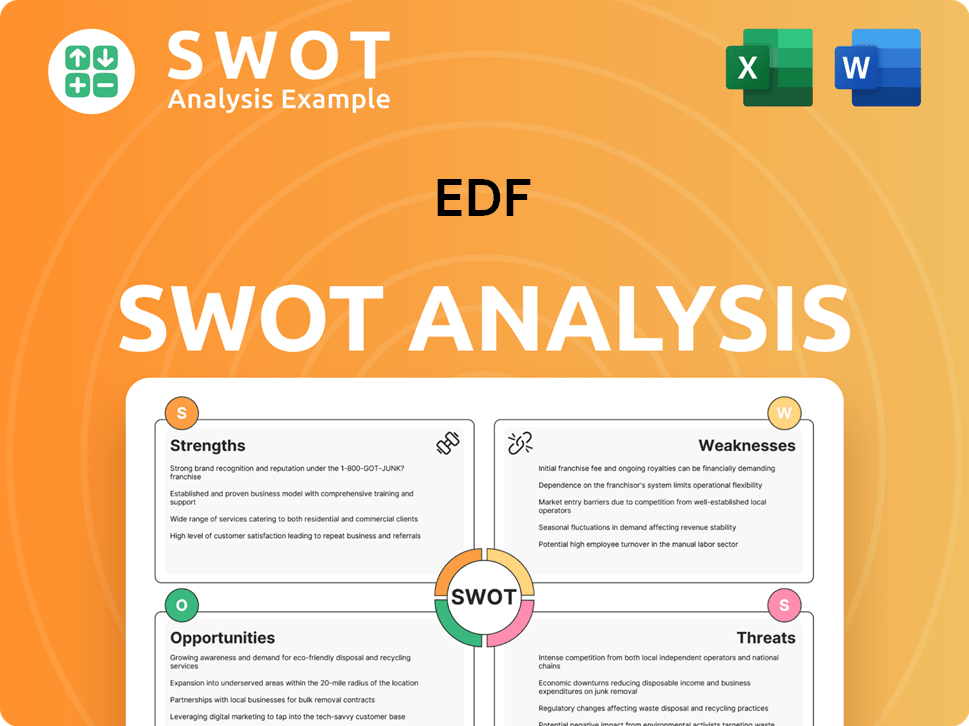
Vision: What is EDF Vision Statement?
EDF's vision is to provide customers with electricity that is available 24/7, low-carbon, and competitive.
Let's delve into the Revenue Streams & Business Model of EDF and its vision.
The EDF vision, as articulated through its 'Ambitions 2035' plan, is centered on the energy transition. It aims to secure a sustainable and reliable energy supply for its customers. This vision is a crucial element of the EDF strategy.
EDF's long-term vision focuses on delivering electricity that is not only consistently available but also environmentally responsible and economically viable. This commitment is a key aspect of the EDF mission. The company aims to achieve net-zero emissions by 2050.
EDF's goals are supported by strategic investments in nuclear and renewable energy sources. The company is actively involved in expanding its renewable energy capacity, with a target of over 50 GW of gross capacity by 2030. These investments are vital for realizing the EDF vision statement.
The EDF company recognizes the need to adapt to industry changes, including the increasing demand for sustainable energy solutions. EDF aims to maintain its position as a leading player in the energy sector by embracing innovation and efficiency. This approach is critical for EDF's future plans and goals.
EDF's vision is aspirational in its commitment to a sustainable energy future. However, it is also grounded in tangible actions and strategic priorities, such as investments in new technologies and operational improvements. This balance is essential for EDF's long-term vision for the future.
The EDF vision encompasses several key elements. These include a focus on net-zero emissions, expansion of renewable energy capacity, and maintaining a competitive edge in the market. These elements are central to understanding what is the mission statement of EDF.
The EDF mission and vision are closely intertwined, with the vision serving as the guiding star for the company's strategic direction. EDF's commitment to sustainability and innovation is evident in its approach to renewable energy, aiming to significantly increase its green energy portfolio. Understanding the EDF core values is crucial to appreciating how the company intends to achieve its vision.
EDF PESTLE Analysis
- Covers All 6 PESTLE Categories
- No Research Needed – Save Hours of Work
- Built by Experts, Trusted by Consultants
- Instant Download, Ready to Use
- 100% Editable, Fully Customizable
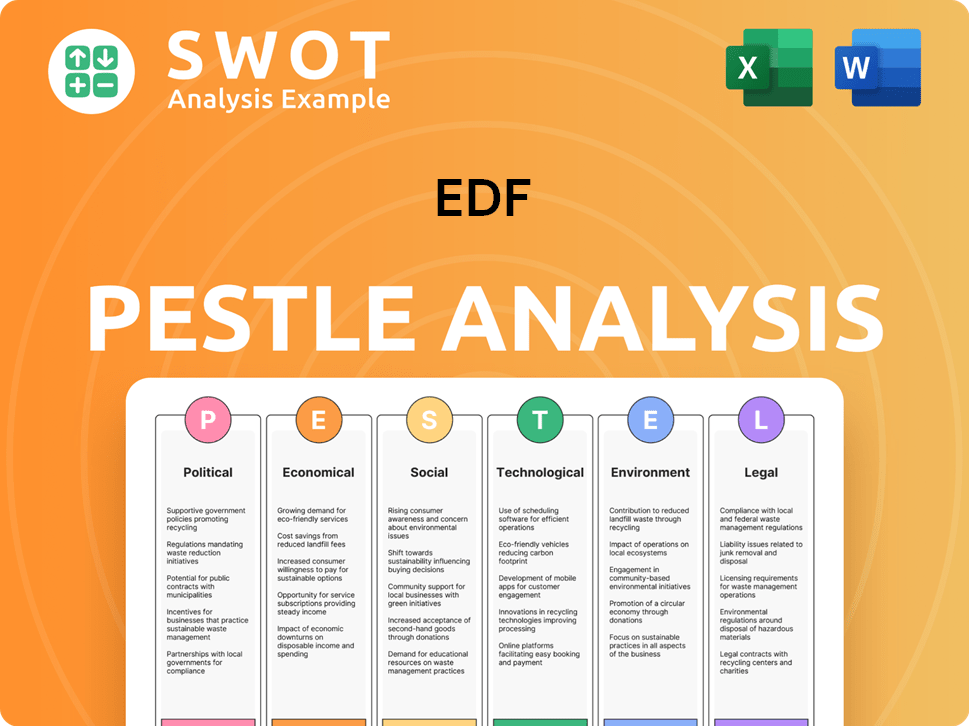
Values: What is EDF Core Values Statement?
Understanding the core values of EDF (Électricité de France) is crucial to grasping its operational philosophy and strategic direction. These values, though not always presented in a rigid list, are deeply embedded in the company's actions and communications, guiding its approach to the energy sector.
Safety is a paramount value for EDF, especially given its significant involvement in nuclear energy. This commitment is reflected in rigorous safety protocols and extensive training across all operations, from power generation to distribution and maintenance. For example, in 2024, EDF's focus on industrial control of stress corrosion checks and repairs in nuclear plants contributed to higher output, showcasing their dedication to safety. This extends to the well-being of employees, customers, and the communities where they operate.
Exercising sound business judgment, or "Good Sense," is another evident value. This is reflected in EDF's strategic decisions regarding investments, operational efficiency, and financial management. Their ability to achieve sound financial results in 2024, despite lower market prices, indicates a focus on good sense in managing their assets and operations, ensuring long-term financial health and stability. This is a key component of their overall Marketing Strategy of EDF.
EDF demonstrates a strong commitment to sustainability and decarbonization, which underpins many of its actions. This is evident in their targets to reduce CO2 emissions and their investments in renewable energy and nuclear power. Their goal to achieve carbon neutrality by 2050 and their ambitious short- and medium-term emission reduction targets differentiate them as a leader in the energy transition. In 2024, EDF invested heavily in renewable projects, aiming to increase its green energy capacity by a significant percentage by 2030.
EDF emphasizes transparent and open dialogue with stakeholders, particularly in the context of new projects. This commitment to engaging with communities and customers fosters trust and helps address concerns, differentiating them as a socially responsible company. This includes regular updates on their progress toward achieving their
These
How Mission & Vision Influence EDF Business?
The mission and vision of EDF (Électricité de France) are not merely aspirational statements; they are the guiding principles that shape the company's strategic decisions and operational priorities. These foundational elements drive EDF's commitment to a sustainable energy future.
EDF's mission and vision are directly reflected in its 'Ambitions 2035' plan, a comprehensive strategy aimed at achieving net-zero emissions. This plan underscores EDF's commitment to providing low-carbon, reliable, and competitive electricity. The 'Ambitions 2035' plan is a clear example of how the company translates its core values into actionable strategies.
- The plan focuses on decarbonizing its operations and expanding its renewable energy portfolio.
- It involves significant investments in nuclear power, renewable energy projects, and innovative solutions.
- The strategy is designed to ensure EDF remains a leader in the energy transition.
- This strategic alignment is crucial for long-term sustainability and success.
A core aspect of EDF's strategy is its investment in both nuclear and renewable energy sources. This dual approach supports the company's mission to provide low-carbon electricity while ensuring a diversified energy mix. EDF's commitment to nuclear power is evident in projects like the Flamanville EPR reactor, which, despite facing delays and cost overruns, remains a key part of its low-carbon strategy.
EDF is significantly expanding its renewable energy projects, including wind and solar farms. In 2023, EDF Renewables North America put 605 MW of onshore wind, solar, and storage projects into service, demonstrating a strong commitment to sustainable energy sources. This expansion is crucial for achieving EDF's vision of a net-zero energy future.
EDF has set ambitious CO2 emission reduction targets to align with its mission and vision. The company aims for a 65% reduction in Scope 1 emissions by 2027 compared to 2017 levels, and an 80% reduction by 2035. These measurable targets demonstrate EDF's commitment to combating climate change and are central to its strategic priorities.
EDF's mission includes providing innovative solutions and services, which is reflected in its focus on energy efficiency, smart grids, and electric mobility infrastructure. Enedis, managed independently by EDF in France, reported a 21% increase in installed capacity for electric vehicles in 2024, showcasing EDF's commitment to supporting the transition to electric mobility.
These strategic decisions have significant financial implications. Investments in renewable energy and nuclear projects require substantial capital expenditure. However, they are crucial for long-term sustainability and aligning with EDF's core values. Furthermore, the company's commitment to decarbonization can attract investors focused on Environmental, Social, and Governance (ESG) factors.
EDF's mission and vision shape both its long-term planning and day-to-day operations. This includes driving investments, setting operational targets, and fostering a culture of sustainability and innovation. The company's focus on these areas ensures it remains competitive in the evolving energy market.
In conclusion, EDF's mission, vision, and core values are the driving forces behind its strategic decisions, influencing investments, innovations, and operational practices. For a deeper understanding of EDF's growth trajectory, consider exploring the Growth Strategy of EDF. The next chapter will delve into potential core improvements to the company's mission and vision.
EDF Business Model Canvas
- Complete 9-Block Business Model Canvas
- Effortlessly Communicate Your Business Strategy
- Investor-Ready BMC Format
- 100% Editable and Customizable
- Clear and Structured Layout
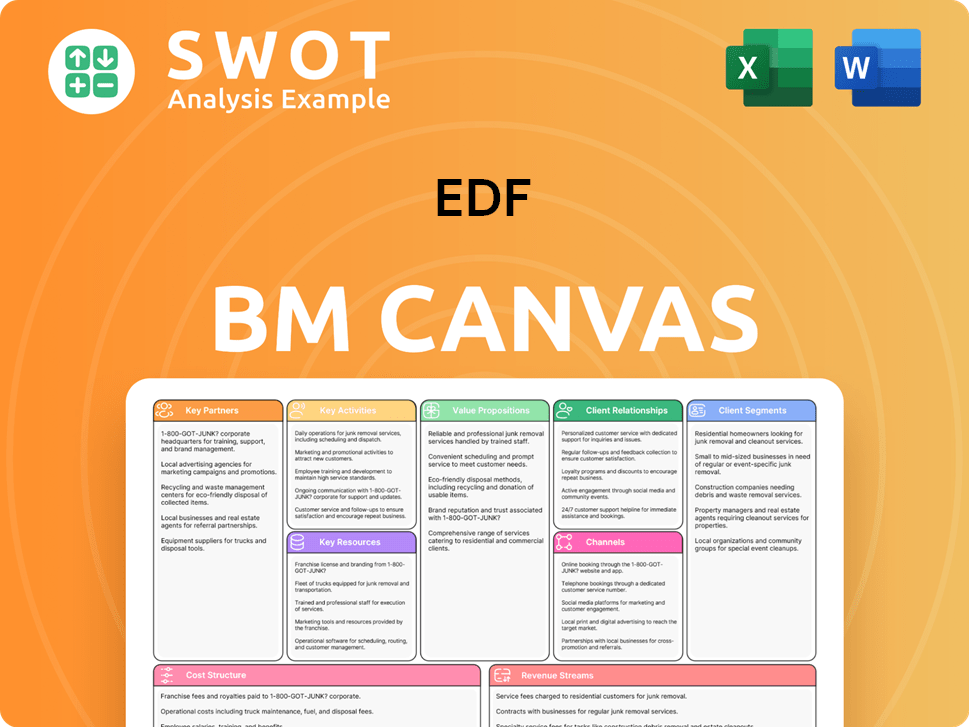
What Are Mission & Vision Improvements?
While EDF's mission and vision are already well-defined, there's always room for enhancement to ensure they remain relevant and impactful in a rapidly evolving energy landscape. This section explores four key areas where EDF could potentially refine its guiding principles to further solidify its position as a leader in the energy transition and better align with evolving societal expectations.
To strengthen its commitment to customers, EDF could explicitly incorporate energy affordability into its mission or vision. This would directly address concerns about rising energy costs and demonstrate a dedication to a just transition, especially important given the current economic climate where energy prices fluctuate significantly. For instance, in the UK, the average household energy bill reached £1,928 per year in 2023, highlighting the need for affordable energy solutions.
While EDF mentions "innovative solutions and services," a more detailed focus on specific technological advancements could enhance clarity. Highlighting areas like advanced grid management, energy storage technologies (which are projected to grow to a $15.4 billion market by 2027), and digital solutions would showcase a forward-thinking approach and demonstrate a commitment to addressing emerging industry trends. This would help stakeholders better understand how EDF plans to achieve its EDF goals.
The energy landscape is shifting towards decentralization, with an increasing number of prosumers. EDF could strengthen its relevance by adapting its mission and vision to reflect a more dynamic, distributed energy system, potentially including language about supporting community-based energy projects. This proactive approach would position EDF to capitalize on the growth of distributed generation, which is expected to increase significantly in the coming years.
Comparing with industry best practices, EDF could benefit from more explicitly integrating social equity and community empowerment into its core statements. This could involve specific commitments to supporting underserved communities, promoting equitable access to clean energy, and fostering community involvement in energy projects. Such an approach would not only enhance EDF's reputation but also align with the growing importance of Environmental, Social, and Governance (ESG) factors in investment decisions.
How Does EDF Implement Corporate Strategy?
Implementing a company's mission, vision, and core values is crucial for translating strategic intent into tangible results. EDF, as a leading energy provider, demonstrates this implementation through various initiatives and strategic programs, ensuring its stated principles guide its operations and future endeavors.
EDF's commitment to its mission and vision is evident in its strategic programs, particularly the 'Ambitions 2035' corporate plan. This plan serves as a roadmap for achieving a net-zero energy future, outlining specific objectives and CSR commitments that shape the company's actions. This includes a focus on expanding renewable energy capacity and reducing carbon emissions.
- The 'Ambitions 2035' plan includes a significant investment in renewable energy sources.
- EDF aims to increase its renewable energy capacity to over 100 GW by 2030.
- The company is investing heavily in solar, wind, and hydroelectric projects.
- CSR commitments are integrated into all aspects of the business.
Leadership plays a pivotal role in reinforcing EDF's mission, vision, and core values throughout the organization. Luc Rémont, EDF's Chairman and Chief Executive Officer, consistently emphasizes the company's commitment to providing low-carbon and competitive energy solutions. This commitment is demonstrated through actions such as improving generation capacity and offering customized energy contracts.
EDF communicates its mission, vision, and core values to stakeholders through various channels to ensure transparency. The company publishes comprehensive reports, including annual and sustainability reports, and maintains an informative corporate website. The 2024 Universal Registration Document and Annual Financial Report provide detailed insights into EDF's sustainability initiatives and corporate governance practices.
EDF's actions provide concrete examples of how its stated values translate into business practices. Investments in projects like the Flamanville EPR nuclear reactor and renewable energy initiatives directly reflect EDF's commitment to low-carbon generation. Safety in operations and community engagement also demonstrate the practical application of its core values.
EDF has established formal programs and systems to ensure alignment between its values and operations. The new global framework agreement on corporate social and environmental responsibility for 2025-2030 covers human rights, environmental protection, and a just transition, demonstrating a structured approach to embedding its values throughout the organization. For more details on EDF's mission, vision, and core values, you can read this article: Understanding EDF's Core Principles.
EDF Porter's Five Forces Analysis
- Covers All 5 Competitive Forces in Detail
- Structured for Consultants, Students, and Founders
- 100% Editable in Microsoft Word & Excel
- Instant Digital Download – Use Immediately
- Compatible with Mac & PC – Fully Unlocked
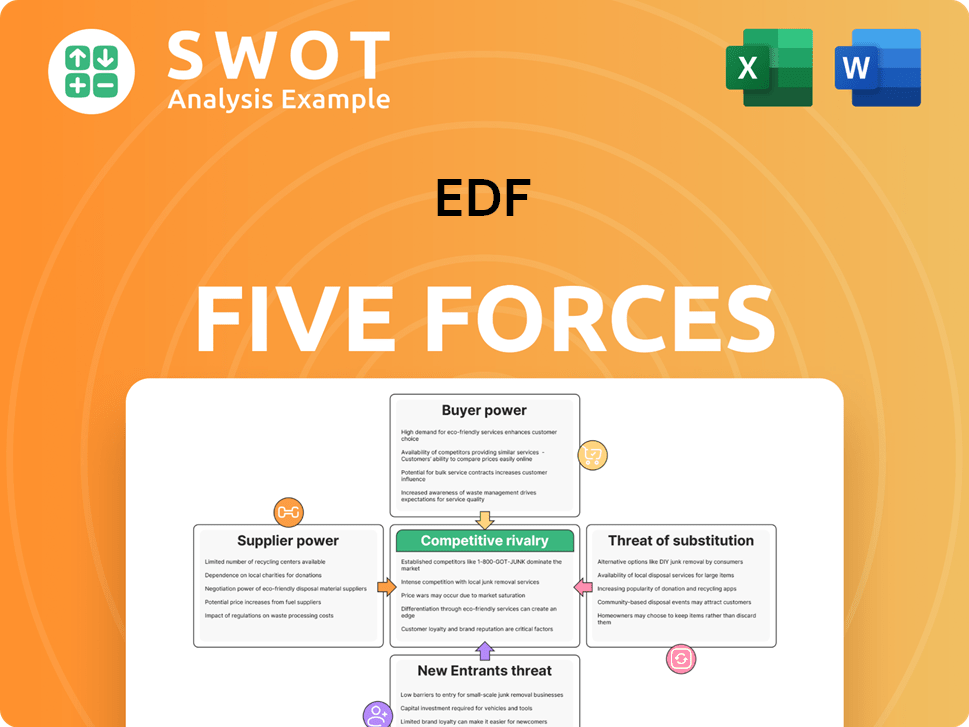
Related Blogs
- What are Mission Vision & Core Values of EDF Company?
- What is Competitive Landscape of EDF Company?
- What is Growth Strategy and Future Prospects of EDF Company?
- How Does EDF Company Work?
- What is Sales and Marketing Strategy of EDF Company?
- Who Owns EDF Company?
- What is Customer Demographics and Target Market of EDF Company?
Disclaimer
All information, articles, and product details provided on this website are for general informational and educational purposes only. We do not claim any ownership over, nor do we intend to infringe upon, any trademarks, copyrights, logos, brand names, or other intellectual property mentioned or depicted on this site. Such intellectual property remains the property of its respective owners, and any references here are made solely for identification or informational purposes, without implying any affiliation, endorsement, or partnership.
We make no representations or warranties, express or implied, regarding the accuracy, completeness, or suitability of any content or products presented. Nothing on this website should be construed as legal, tax, investment, financial, medical, or other professional advice. In addition, no part of this site—including articles or product references—constitutes a solicitation, recommendation, endorsement, advertisement, or offer to buy or sell any securities, franchises, or other financial instruments, particularly in jurisdictions where such activity would be unlawful.
All content is of a general nature and may not address the specific circumstances of any individual or entity. It is not a substitute for professional advice or services. Any actions you take based on the information provided here are strictly at your own risk. You accept full responsibility for any decisions or outcomes arising from your use of this website and agree to release us from any liability in connection with your use of, or reliance upon, the content or products found herein.